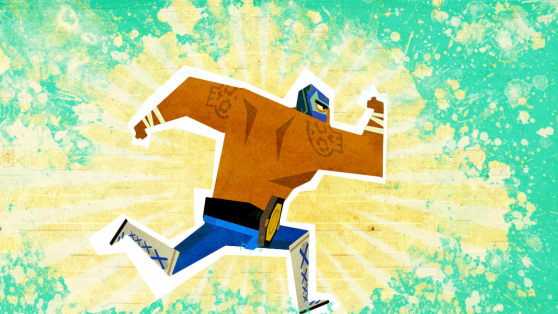This post has not been edited by the GamesBeat staff. Opinions by GamesBeat community writers do not necessarily reflect those of the staff.
Our understanding of stereotypes is often wrought with negative connotations. The word itself is derived from the original Greek to mean “solid impression.” Popular use of the word changed in the 1920s, when American journalist Walter Lippman used it in psychological terms. Henceforth, the definition was “an image perpetuated without change.”
Ironically, the word is its own stereotype: Most of us associate it with the possession of negative viewpoints or thoughts about specific people, places, and things. In the current era of political correctness, many often skip the use of the word and jump to the conclusion of generalization and sometimes racism, sexism, and bigotry.
In the case of Drinkbox Studios’ most recent indie release, Guacamelee!, I feel as if stereotyping has been applied in a loving and respectful manner that other studios could learn from.

Drinkbox Studios is a Canadian development team made up of 10 employees, best known for their work on the indie series Tales From Space. Their most recent effort comes in the form of the multiplatform release Guacamelee!, an action-adventure platformer very much in the vein of such celebrated games as Metroid and Castlevania.
Incredibly stylized in art design as well as story, Guacamelee! is the story of wannabe luchador Juan Aguacate’s journey to save his town and the woman he loves from the evil undead Charro, Carlos Calaca. Gaining the powers of the much-beloved type of Mexican wrestler, the luchador, Juan punches, kicks, and suplexes the forces of evil in a quest to save El Presidente’s daughter, his lifelong unrequited love.
The game itself is saturated in bright colors; livened with soothing, catchy Mariachi-style music; and drenched in the assumed connotations that come along when one thinks about Mexican culture. Advertisements for luchador contests, tequila, and El Presidente litter the landscape. The character’s dialogue is spattered with Spanish words thrown into English sentences, such as references to someone as an amigo or telling a character to “andale!” (hurry up).

The game is covered in common stereotypes of generalized Mexican culture, but none of this is done in poor taste. However, the question remains, is the stereotype doing a disservice to what it’s trying to represent?
To answer that, I would say no. This is a case where I feel that the stereotype can’t be viewed in a negative manner due to the portrayal of the scenery and characters. While Juan Aguacate (who works in the fields) literally translates to “avocado,” this is no reason to throw up pitchforks toward a development team made up completely of Canadians.
I found the stereotypes in Guacamelee! to represent the most positive qualities of the Mexican culture — respect, honor, tradition, and love for family. The musical accompaniments are beautifully scripted acoustical Mariachi pieces that change tone from upbeat to sorrowful depending on whether the character is in the land of the living or the dead — an ability that Juan gains halfway through the game.

The game’s basis is the idea of the luchador as an honorable superhero, a defender of the people, and an idol to aspire to. At one point, Juan is charged with helping to soothe an undead child who wants her favorite toy back: a doll of her favorite luchador.
Enemies cower is fear of the sheer power and notoriety of the luchador. At one point, a rival character reveals his own honor and integrity in wanting to fight Juan one-on-one and respects him even in defeat.
The most memorable moment for me comes after Juan has gained the ability to switch between the lands of the living and dead. In the land of the living, he finds a grave site just outside of a forest that has been ornately decorated to celebrate Día de los Muertos, the Day of the Dead. A character early on alludes to this, saying people decorated the grave to celebrate their love for those who have passed.
When I flipped Juan to the land of the dead in the exact same spot, a new scene is shown. Instead of a grave site, I found a magnificent table covered in candles, decorations, and an impressive spread of food. An undead man was moving back and forth at the table. When questioned, he mentioned that he was preparing the table to celebrate Día de los Muertos with his loved ones, who remain in the land of the living, and honor their presence in his life.

Maybe I am an overly emotional, sympathetic fool, but this moment made me stop in my tracks and appreciate the style and substance found within the game’s generalizations of the Mexican culture. Is it silly in tone? Mostly. After all, you spend the game pile-driving skeletons and collecting piñata parts as power-ups. But these takeaways from Mexican culture never feel like they are mocking or disrespectful. I also should mention that you spend a good portion of the game turning into a chicken. But never once did I feel like the characters were being marginalized.
I find Guacamelee! to be a perfect example of how to respectfully and tastefully use a stereotype to the advantage of your game’s art style, tone, and themes. Drinkbox struck a balance between homage and generalization that brings a unique style and voice to a culture that is often harshly portrayed in entertainment mediums.
Guacamelee! proves that stereotypes can have a positive influence on game design if used well, and I hope other developers take note in the future.


